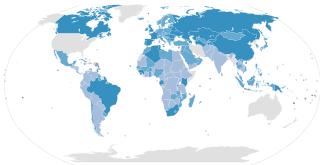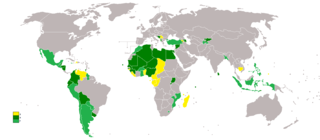External links
- Text.
| C66 | |
|---|---|
| ILO Convention | |
| Date of adoption | June 28, 1939 |
| Date in force | Withdrawn May 30, 2000 |
| Classification | Migrant Workers |
| Subject | Migrant Workers |
| Previous | Penal Sanctions (Indigenous Workers) Convention, 1939 (shelved) |
| Next | Hours of Work and Rest Periods (Road Transport) Convention, 1939 (shelved) |
Migration for Employment Convention, 1939 is an International Labour Organization Convention.
It was established in 1939, with the preamble stating:
Having decided upon the adoption of certain proposals with regard to the recruiting, placing and conditions of labour (equality of treatment) of migrant workers,...
The treaty was not ratified by any countries and was never brought into force.
The convention was withdrawn at the ILO General Conference May 30, 2000.
The principles found in the convention were subsequently revised and included in the ILO Convention C97, Migration for Employment Convention (Revised), 1949.

The International Labour Organization (ILO) is a United Nations agency whose mandate is to advance social and economic justice through setting international labour standards. Founded in October 1919 under the League of Nations, it is the first and oldest specialised agency of the UN. The ILO has 187 member states: 186 out of 193 UN member states plus the Cook Islands. It is headquartered in Geneva, Switzerland, with around 40 field offices around the world, and employs some 3,381 staff across 107 nations, of whom 1,698 work in technical cooperation programmes and projects.

The ILO Convention concerning Minimum Age for Admission to Employment C138, is a convention adopted in 1973 by the International Labour Organization. It requires ratifying states to pursue a national policy designed to ensure the effective abolition of child labour and to raise progressively the minimum age for admission to employment or work. It is one of eight ILO fundamental conventions. Convention C138 replaces several similar ILO conventions in specific fields of labour.

Trafficking of children is a form of human trafficking and is defined by the United Nations as the "recruitment, transportation, transfer, harboring, and/or receipt" kidnapping of a child for the purpose of slavery, forced labor and exploitation. This definition is substantially wider than the same document's definition of "trafficking in persons". Children may also be trafficked for the purpose of adoption.

The International Convention on the Protection of the Rights of All Migrant Workers and Members of Their Families is a United Nations multilateral treaty governing the protection of migrant workers and families. Signed on 18 December 1990, it entered into force on 1 July 2003 after the threshold of 20 ratifying States was reached in March 2003. The Committee on Migrant Workers (CMW) monitors implementation of the convention, and is one of the seven UN-linked human rights treaty bodies. The convention applies as of August 2021 in 56 countries.
Maternity Protection Convention, 1919 is an International Labour Organization Convention.
The Right to Organise and Collective Bargaining Convention (1949) No 98 is an International Labour Organization Convention. It is one of eight ILO fundamental conventions.
Fee-Charging Employment Agencies Convention, 1933 (shelved) is an International Labour Organization Convention.
Fee-Charging Employment Agencies Convention (Revised), 1949 is an International Labour Organization Convention.
Maternity Protection Convention, 2000 is an International Labour Organization Convention.
Migration for Employment Convention (Revised), 1949 is an International Labour Organization Convention for migrant workers.
See also: Child Labour
The Indigenous and Tribal Peoples Convention, 1989 is an International Labour Organization Convention, also known as ILO Convention 169, or C169. It is the major binding international convention concerning indigenous peoples and tribal peoples, and a forerunner of the Declaration on the Rights of Indigenous Peoples.
The Convention concerning Discrimination in Respect of Employment and Occupation or Discrimination Convention is an International Labour Organization Convention on anti-discrimination. It is one of eight ILO fundamental conventions. The convention requires states to enable legislation which prohibits all discrimination and exclusion on any basis including of race or colour, sex, religion, political opinion, national or social origin in employment and repeal legislation that is not based on equal opportunities.
Migrant domestic workers are, according to the International Labour Organization’s Convention No. 189 and the International Organization for Migration, any persons "moving to another country or region to better their material or social conditions and improve the prospect for themselves or their family," engaged in a work relationship performing "in or for a household or households." Domestic work itself can cover a "wide range of tasks and services that vary from country to country and that can be different depending on the age, gender, ethnic background and migration status of the workers concerned." These particular workers have been identified by some academics as situated within "the rapid growth of paid domestic labor, the feminization of transnational migration, and the development of new public spheres." Prominent discussions on the topic include the status of these workers, reasons behind the pursue in this labour, recruitment and employment practices in the field, and various measures being undertaken to change the conditions of domestic work among migrants.

The Employment Agencies Act 1973 (c.35) is a United Kingdom Act of Parliament and part of a wider body of UK agency worker law. It regulates the conduct of employment agencies which recruit and manage temporary and permanent labour. It applies to approximately 17,000 employment agencies operating in the UK. It was introduced by a private member's bill by Kenneth Lewis, member of parliament for Rutland and Stamford.
Trade unions in Laos have been active in the country since at least the mid-20th Century.
The Conventions concerning Employment of Women during the Night are conventions drafted by the International Labour Organization (ILO) which prohibit women from performing industrial work during the night. The first convention was adopted in 1919 and revised versions were adopted in 1934 and 1948. A protocol to the convention was adopted in 1990 allowing for easing of the restriction under conditions. As of April 2011 the conventions had 27, 15, 46 (undenounced) ratifications respectively. The protocol was ratified 5 and denounced by 2.

The International Training Centre of the International Labour Organization (ITCILO) is the training arm of the International Labour Organization (ILO). It runs training, learning and capacity development services for governments, employers' organizations, workers' organizations and other national and international partners in support of Decent Work and sustainable development. It is part of the United Nations System.
The International Domestic Workers Federation is the first membership-based global organization of household and domestic workers. The IDWF has 81 affiliates in 63 countries, representing over 590,000 members.